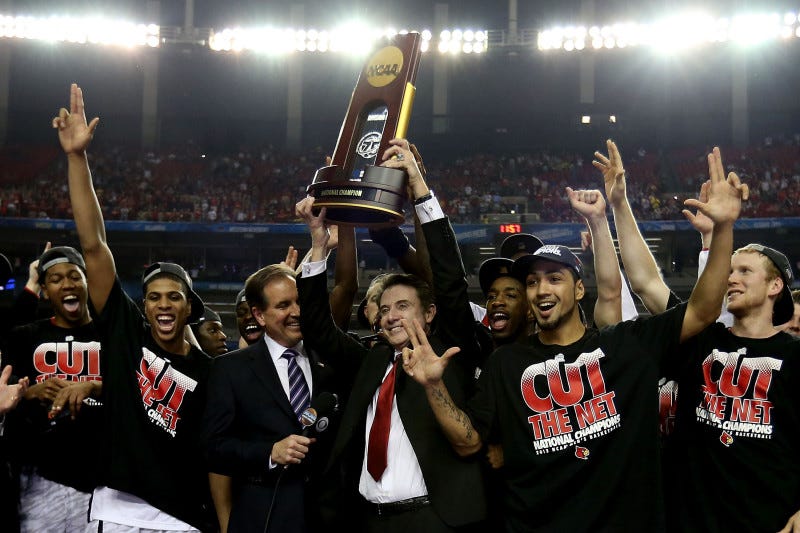Michigan and Louisville just fought over a basketball coach. It's not the first time
Long before Dusty May, the Wolverines and Cardinals both vied for the services of Rick Pitino. His decision changed the modern history of both programs
As the NCAA Tournament resumes this week with the Sweet 16 and Elite Eight, the next-biggest story in the college basketball universe continues away from the court, with programs jockeying for position in the hopes that they, too, can soon be among the final handful of teams remaining in the chase for a national championship.
Indeed, the moniker of March Madness can apply just as much to the annual coaching carousel as it can the NCAA Tournament itself.
The rhythms of the cycle are familiar to anyone who follows the sport. Coaches are fired. Replacements are breathlessly bandied about by fans and media alike. Interviews and meetings are reported on. Every now and then, planes are tracked. And, by the end of it all, an offer gets made and a coach, in one of the few moments many of them wear a suit anymore, stands behind a dais with a wide smile on his face and an eager audience in front of him.
So far this offseason, nine head-coaching positions at programs in the Power Five conferences and the Big East have come open. Based on past historical success, resources, prestige and potential, three in particular stood out – Ohio State, Michigan and Louisville. Once the Buckeyes promoted interim head coach Jake Diebler to the permanent role, it left the Wolverines and Cardinals left to choose from their pick of presumptive candidates.
Soon enough, both programs settled on the same target – Florida Atlantic’s Dusty May, who led the Owls on an improbable run to the 2023 Final Four and, in the process, went from a relative unknown to the go-to mid-major coach that whose name gets linked to any major-conference opening. By last Saturday, May had made his choice. The Illinois native and Indiana graduate was heading back to the Big Ten, selecting Michigan after being predicted to go to Louisville by many of the sport’s top insiders.
As seismic as the move felt, with the biggest domino of that year’s coaching cycle making a decision that would ultimately affect dozens of other programs, it wasn’t even the first time Michigan and Louisville had competed for a coach.
Help needed
In March 2001, the men’s basketball programs at Louisville and Michigan were in search of something – anything, really – to get back to where they expected to be.
Not even a full decade earlier, the Wolverines weren’t just a college basketball team, but a phenomenon, with their famed Fab Five that redefined the sport from a team-building, cultural and aesthetic standpoint. What resulted from that era, though, was scandal, one that ultimately forced the program to vacate two Final Fours while thrusting it into years of instability and uncertainty.
After missing the NCAA Tournament in three consecutive seasons and going 37-51 in that time, coach Brian Ellerbe was forced out in March 2001.
For the Cardinals, it wasn’t much better. Denny Crum had turned what was already a strong program when he took it over in 1971 into a national powerhouse, winning two national championships and making six Final Fours.
By the turn of the century, though, Louisville had slipped, missing the NCAA Tournament in two of four seasons and, even when it did make it, losing in the first round as a No. 7 seed in both trips. In the final weeks of a 12-19 season, matching the fewest wins in his 30 years at the school, Crum announced on his 64th birthday that he would be retiring at the end of the 2001-02 season, marking the end of an acrimonious two-month back-and-forth between him and athletic director Tom Jurich after Jurich wouldn’t agree to extend Crum’s soon-to-expire contract. Though Crum insisted his retirement was his own decision and that he wasn’t forced out, he was paid a $7 million package to exit.
Soon enough, Michigan and Louisville’s eyes turned to the same potential savior, the man the college basketball world had its collective gaze on in anticipation of his return – Rick Pitino.
Keep reading with a 7-day free trial
Subscribe to The Front Porch to keep reading this post and get 7 days of free access to the full post archives.




